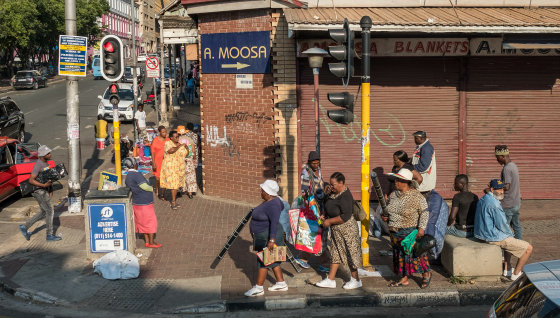South African data show that severe urban blockades did not prevent the spread of the new coronavirus infection

In South Africa, the blockade of the city (lockdown) began on March 27, 2020 following the epidemic of the new coronavirus infection (COVID-19), but going out other than purchasing daily necessities and receiving medical care Data showed that the banned strict lockdown did not prevent the spread of the infection. On the other hand, it is said that the infection spreads by implementing lockdown, and that 'herd immunity was acquired' unintentionally.
COVID-19 in South Africa --ScienceDirect
https://www.sciencedirect.com/science/article/pii/S2590113320300183?via%3Dihub
Lockdown didn't work in South Africa: why it shouldn't happen again
https://theconversation.com/lockdown-didnt-work-in-south-africa-why-it-shouldnt-happen-again-147682
The 'Level 5' lockdown in South Africa was considered one of the strictest blockades in the world and was banned from going out for purposes other than critical purposes such as grocery shopping and medical care. All stores that are not essential to daily life have been closed, and the sale of cigarettes and alcohol has been banned.
According to researchers, if level 5 lockdown was effective, the infection rate would have decreased significantly 7 to 14 days after the lockdown began, but in reality this is the case. No significant decrease occurred.
In addition, when the level 5 lockdown became level 4 and level 3 and movement restrictions were relaxed and economic activity resumed, there was no increase in the infection rate.
Below is a graph showing how COVID-19 spread in South Africa over time. The vertical axis shows the number of new infections, the horizontal axis shows the passage of time, and the arrow numbers indicate the lockdown level. The number of infections gradually increased during the level 5 and level 4 lockdowns, peaked during the level 3 lockdowns, and the graph began to decline when entering level 2. If a high level of lockdown is working, lowering the level should increase the infection rate, but no such change has been seen.

From these analyses, researchers conclude that lockdown was not effective in preventing the spread of infection in South Africa.
Researchers pointed out that they knew from the beginning that lockdown was not effective in South Africa. South Africa is overpopulated, shares bathing areas, and people in need have to line up for social security and food rations. It also mentions the difference that South Africa has fewer elderly people than Europe and the United States, and fewer people are affected by COVID-19 in the first place.
Before the lockdown began, researchers said they had warned the government on these points, but said they had succumbed to European pressure.
Severe lockdowns have reduced the working population in South Africa by 5.2 million in the second quarter of 2020. Fifty percent of the poorest workers are 10 times more affected by lockdowns than the wealthy. In addition, the April census shows that 47% of respondents said they would run out of money to buy food by the end of the month.
Lockdowns have also prevented many stores from continuing to operate, with GDP expected to decline 16.4% in the first and second quarters, with annual GDP growth expected to be -51%.
South Africa is promoting the expansion of tests for infectious diseases including HIV, but due to the imposition of movement restrictions, the number of tests was significantly increased from 1.6 million in March to 590,000 in April. Decrease. HIV and tuberculosis deaths are projected to increase by 10-20% over the next five years due to testing interruptions and hard access to drugs.
Researchers can understand that the lockdown was done as of March when the information about COVID-19 was unknown, but as long as the data that the lockdown did not actually work is known, It claims that no further lockdown should be done.

by Martyn Smith
Meanwhile, studies conducted in several South African states have shown that many people carry COVID-19 antibodies, 'South Africa may have acquired herd immunity.' It is also reported . Virgologist Marvin Hsiao said lockdowns have forced many to go to food and social security to take a social distance in queuing in densely populated South Africa. Because it was impossible, on the contrary, a new 'new coronavirus infection network' was created, and I suspect that herd immunity was acquired there.
Although the question of how long immunity will last remains, the tendency of other coronaviruses suggests that it may last for two to three years.
Related Posts:
in Note, Posted by darkhorse_log







